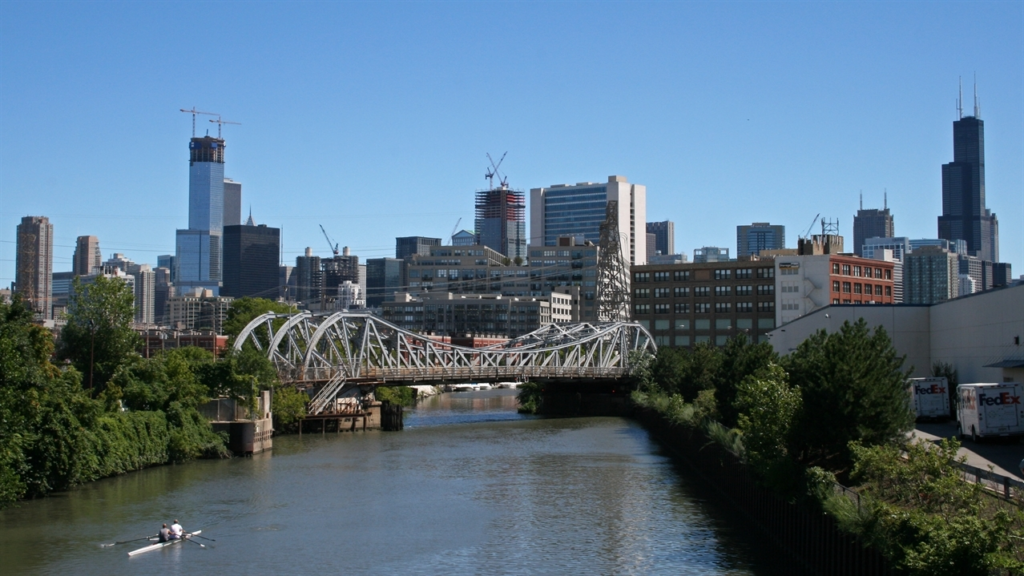The Chicago River Ecology and Governance Task Force Looks ahead to 2022

Since the 2016 release of the Our Great Rivers vision, MPC has been working with stakeholders to ensure that the vision of an inviting, productive, and living Chicago river system becomes a reality. Part of this work has included tracking and celebrating the Our Great Rivers achievements and progress, while also supporting the ongoing efforts of the River Ecology and Governance Task Force (Task Force), a coordinating body that was created in early 2019 to transform Chicago’s waterway system into a thriving and ecologically integrated natural asset. As part of our continuing work on Great Rivers Chicago, we wanted to provide an update on all the work that has been ongoing with the Task Force.
The Chicago River Ecology and Governance Task Force
The River Ecology and Governance Task Force was initiated by a 2019 Executive Order from former Mayor Rahm Emanuel. It called for the Department of Planning and Development (DPD) to work with multiple agencies including the Park District, Forest Preserve District, and the Metropolitan Water Reclamation District on collaboratively supporting Chicago’s rivers. The Task Force currently consists of local, state, and federal government agencies, civic and community organizations, and local institutions. Following the launch of the Task Force in 2019, and a hiatus period in 2020 caused in part by the COVID-19 pandemic, the Task Force got back on track in 2021 with a renewed focus on planning for the river as a dynamic system, shaping river edge development, and informing current city-led policy and planning priorities like the US Army Corps PAS Restoration Framework Plan.
The Importance of collaborative planning for the Chicago Area Waterway System
The River Ecology and Governance Task Force offers a strong framework for partners to align and work together to advance goals from Our Great Rivers as well as tackle new priorities. Success in achieving objectives is often dependent on forming genuine, robust partnerships amongst diverse stakeholders in the Chicago region. The Task Force is an opportunity to do just that by providing the space for coordination, discussion, and consensus-based prioritization in a group that includes participation from across different sectors with the support of multiple government agencies, principally convened by DPD. Much of the structure, function, and collaboration of the Task Force was strengthened in 2021 due to the dedication and hard work of many partners and Task Force member organizations.
2021 Task Force achievements and updates
Two working groups were created to align with membership priorities and a workshop series.
Development Review Working Group
The Development Review Working Group was formally created, providing a venue for river-focused stakeholders and residents to provide feedback on how developments can best comply with the Chicago River Design Guidelines to be more supportive of both Chicago residents and the river’s natural habitat and ecosystems. The Chicago River Design Guidelines, adopted by Chicago Plan Commission in January 2019, outline how properties along the Chicago River should be developed and improved to create a more unified aesthetic, to enhance the natural environment, and to provide public access and recreational opportunities to Chicago residents. Seven river adjacent projects were reviewed as part of the process. Development projects varied in size and scope spanned from the North Branch to the South Branch of the Chicago River and included a variety of project types from large-scale mixed-use to residential. The Development Review Working Group will continue to convene in 2022 and more information about this group, including meeting format and structure, will be available on the City’s website.
Systems Plans Working Group
An early 2021 survey of membership priorities revealed that as a whole the Task Force was interested in collectively working on system-wide planning and policy for Chicago’s rivers. The Systems Plans Working Group was initiated to determine how best the group could work together to create and advance a holistic view of Chicago’s rivers. As a starting point, the working group collectively developed a set of priorities and themes that should guide riverfront development and land use across the system. The top two principles centered on 1) Viewing the rivers as an asset and natural resource, and 2) Increasing the quality of water and aquatic habitats to support the health of both humans and wildlife. A full list of the principles will be released by the Task Force in early Spring as the group looks to focus on building strategies to integrate them into policies and practices that are currently guiding riverfront land uses.
Planning Assistance for the States (PAS) Restoration Framework Plan Workshops
The United States Army Corps of Engineers (USACE) entered into a partnership agreement with DPD and other local government agencies to develop a Chicago Rivers Restoration Framework Plan. The study will be released later in 2022 and includes an inventory of existing conditions, including restoration potential and environmental impacts, and identifies new and existing project opportunities. Task Force members and other community stakeholders participated in river branch-specific workshops hosted by DPD and the USACE to help identify potential opportunity sites for remediation/restoration activities in the Chicago Area Waterway System. These workshops were an important way to connect the restoration needs on the ground in communities with the mapping and other assessments USACE was evaluating. Ultimately, collaborative feedback from the workshops will help develop a list of opportunity projects for the Chicago river system.
Collaboration will continue to steer the Task Force in 2022
Building off the success of last year, we’re excited to see how the work of the Task Force will unfold in 2022. With a solid foundation created through structuring the working groups and workshops, the Task Force is in a position to continue its work collaboratively and expand its reach to become more of a city-wide resource for all residents who live, work or play near Chicago’s rivers.
